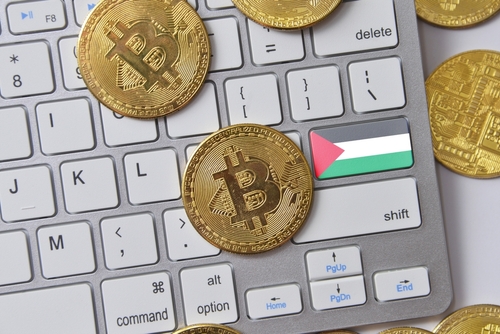ALBAWABA- For many years, the Palestinian cause has long been a symbol of resilience and unwavering determination in the face of the occupation. For decades, the Palestinian people have suffered hardships, including displacement, conflict, and economic challenges. In their pursuit of social justice, freedom, and self-libration, various avenues of support and solidarity have emerged globally. In this era of elite technology and global connectivity, digital currencies like Bitcoin have emerged as a potential tool that could significantly help the Palestinian cause.
While alone, Bitcoin cannot resolve the multifaceted challenges faced by Palestinians, however, it may offer some advantages, this article delves into the ways in which Bitcoin can offer invaluable aid to Palestinians in their continuous struggle for a brighter liberated future, economic stability, and financial inclusion.

(Source: Shutterstock)
1. Financial Freedom and Sovereignty
Financial freedom is one of the fundamental principles behind the creation of Bitcoin. Palestinians residing in the West Bank, Gaza Strip, and other conflict-affected areas sometimes endure financial constraints, such as limited access to banking services and currency exchange restrictions. As a decentralized digital money, Bitcoin allows Palestinians to have greater control over their finances.
Furthermore, Bitcoin's borderless nature makes it easier for Palestinians to engage in international trade and commerce, eliminating some of the limitations imposed by the Israeli siege and travel restrictions. Using BTC, they can transact, save, and invest without relying on traditional financial institutions, which can be influenced by politics and unstable.
Also, the peer-to-peer structure of Bitcoin enables direct transactions between people, bypassing governmental barriers. This immediate link develops a sense of togetherness among Palestinian supporters worldwide. This newfound financial sovereignty may allow Palestinians to build their own economic infrastructure and lessen their reliance on external entities, which leads us to the next point.
2. International Aid and Transparency
The blockchain technology, which is the underlying technology behind Bitcoin, provides transparency, traceability, and openness, which ensures accountability in financial transactions. All those features can be very useful for international humanitarian organizations working in Palestinian territories, making sure that donations and aid reach the intended beneficiaries.
3. Remittances and Financial Inclusion
Bitcoin has the potential to increase financial inclusion among Palestinians who do not have access to banking services. Individuals may participate in the global economy, receive payments, and access financial services with a smartphone and an internet connection, all of which are critical for economic empowerment.
4. Economic Resilience and Investment
Because Bitcoin is a decentralized network, it is less vulnerable to economic manipulation by governments and financial institutions. This is especially useful in politically unstable areas such as Palestine. Bitcoin, as a store of value and an investment choice, can assist Palestinians in protecting their wealth against currency depreciation, freezing and inflation.
Furthermore, Bitcoin has the potential to stimulate investment and business activity in the Palestinian territories. Blockchain technology and cryptocurrency companies have the ability to create job opportunities and boost economic growth, thereby contributing to long-term resilience and prosperity.
5. Cultural Preservation and Heritage Protection
Palestinians have a rich cultural heritage that includes historic structures, food, music, art and artifacts. Unique digital tokens or non-fungible tokens (NFTs) can be developed using blockchain technology to represent and safeguard those cultural assets. This novel strategy has the potential to conserve Palestinian heritage while also providing a new source of cash for maintaining and sharing their cultural heritage.
6. Decentralized Identity and Documentation
For many Palestinians, particularly those who are in diaspora abroad, access to identification and paperwork is a critical concern. These individuals can utilize blockchain technology to generate secure, tamper-proof digital identities that can be used for documentation, service access, and proof of ownership. This can assist Palestinians in asserting their rights, gaining access to necessary services, and protecting their property in a more efficient and transparent manner.
Bitcoin, with its ability to bring monetary autonomy, transparency, and financial resilience, has the potential to be a valuable weapon aiding the Palestinian fight for freedom. While it is not a cure-all, it can help Palestinians and their supporters overcome the obstacles of conflict, financial constraints, and economic insecurity. Palestinians can take substantial strides toward attaining their dreams for justice, freedom, and self-determination by embracing the opportunities presented by cryptocurrencies such as Bitcoin.








